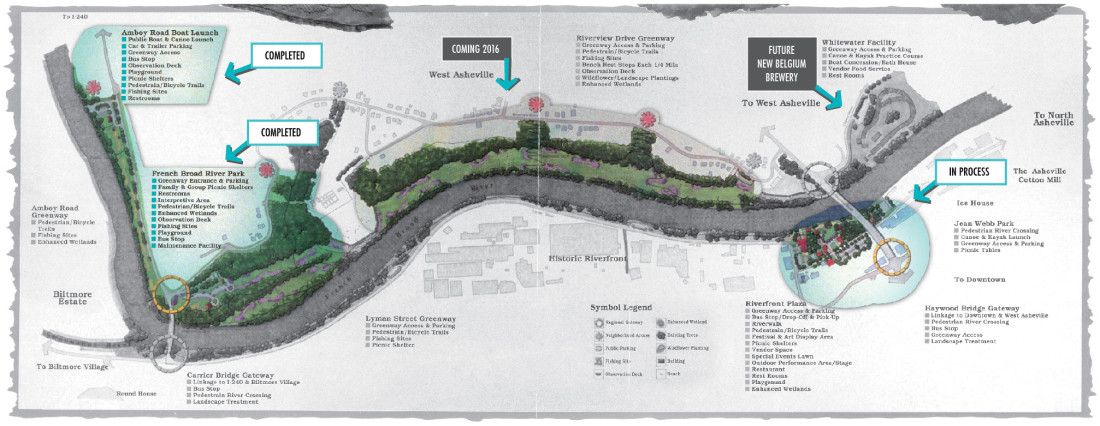After 30 years at the helm, Karen Cragnolin is stepping down from her post as executive director of RiverLink.
Cragnolin founded the nonprofit in 1986, long before most people in Asheville saw the French Broad River area as a potential asset for the city. Now a thriving part of the region’s economy, the River Arts District is dotted with businesses and greenways. Tourists and residents alike enjoy frequent special events and activities in the area.
“When I arrived in Asheville, I didn’t even know there was a river,” Cragnolin recalls. “The downtown was dead and scary, and the town’s general atmosphere was what I call 1929 ‘Depression melancholy hangover,’ with just a few folks thinking Asheville could ever become a vibrant city.” At the time, she adds, the French Broad was hardly on anyone’s radar, but a series of events piqued her interest in it.
As a new resident of the city, Cragnolin connected with the local Chamber of Commerce right away. At the Chamber, she says, “They told me the river was at the end of Patton Avenue. They also gave me a key to a building and introduced me to the folks at the French Broad River Foundation. From that confluence, RiverLink was born — when economic interests (the Chamber) and environmental interests (Jean Webb) met. Jean Webb was also my neighbor and became my best friend, my mentor and my hero.”
Though Cragnolin saw early progress on riverfront redevelopment efforts as promising, there were detractors. “I can’t tell you how many civic leaders told us it was just too far from the downtown and was too hard to find and too far gone to ever be a viable community asset. Those same people thought that West Asheville would always be Worst Asheville and couldn’t imagine it becoming the vibrant neighborhood it has become today.”
The area that once was called “too far from downtown” is now home to New Belgium Brewing’s East Coast distribution center, one of America’s largest craft breweries. A variety of restaurants, art studios, parks and other amenities are flourishing in the district.
While Cragnolin always knew the riverfront had enormous potential, the eventual form of the area went through a number of iterations. “The 1992 plan that we commissioned Edward D. Stone Jr. to develop showed that linkage and envisioned pedestrian bridges and a four-mile greenway loop encompassing both sides of the river. That plan showed an artificial whitewater course instead of New Belgium on the site. We even hosted officers from the U.S. Olympic Organizing Team and tried to have the French Broad be named the site of the 1996 Olympic whitewater trials, rather than the isolated Ocoee River in Tennessee, where it ended up being held.”
However, Cragnolin says she’s thrilled with the New Belgium site and also notes, “We are proud partners in the rebirth of the old landfill site, which will demonstrate the very best management practices for stormwater controls, thanks to a $400,000 grant we received from the Clean Water Trust Fund to assist with the New Belgium project.”
Riverfront sites that once were considered worthless are now selling for big bucks. “Today, banks are willing and competing to lend money to investors in the river area. A riverfront building we and the Preservation Society sold in 1995 for $50,000 was recently resold for $1 million,” Cragnolin notes.
As for the future of the river, Cragnolin still has a vision. “Imagine if we had greenways and bike paths on both sides of the Swannanoa River, and if Thompson Street and Swannanoa River Road both allowed multimodal traffic flow. Imagine how that would increase our tax base and transit options and improve the health of the river.” And she doesn’t see progress ending there. “We hope to see a greenway and multimodal transportation, from the headwaters in Transylvania County, with links to the Ecusta Trail, all the way to Madison County; a greenway along Hominy Creek that links to Haywood County; the reintroduction of passenger-train traffic along the river all the way to Knoxville, just as the popular Carolina Special used to do; the rebirth of our beloved Cotton Mill, twice struck by arsonists; and, and, and — and lots more,” she explains.
Cragnolin will continue to serve as executive director until a new leader is hired. At that point, she will transition to a new role as Strategic Property Transition Consultant with the organization. RiverLink Board of Directors Chair Esther Cartwright says, “We are fortunate that after 30 years at the helm, she will be staying on with us in this new role where her expertise will continue to benefit Western North Carolina.”
RiverLink is accepting donations in honor of Cragnolin’s legacy at the organization’s website.




Such a great thing that Karen started, and such great work they’ve done over the years. Thanks for everything.
I second that!
My deep appreciation Karen for leading the effort to revitalize our riverfront. Your sustained commitment is paying dividends that will benefit Asheville long into the future. Thank you.
I arrived in 1991 and have seen a lot of positive change over the years, both downtown and along the river. Thank you, Karen, for all your hard work and dedication. Our entire region owes you a debt of gratitude! Happy to learn that you will continue as a consultant with RiverLink.
Karen will be missed.
The McRoaring NCDEQ administration is taking us back to the days when orange smoke from factories was ok and black and blue dyed rivers below Cone Mills was legal. I nominate Hartwell as de new boss.